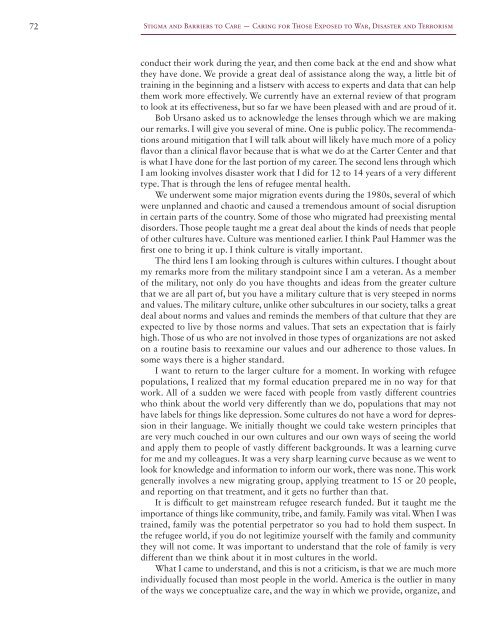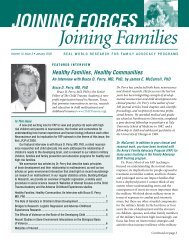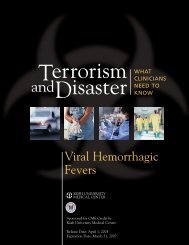stigma and barriers to care - Uniformed Services University of the ...
stigma and barriers to care - Uniformed Services University of the ...
stigma and barriers to care - Uniformed Services University of the ...
You also want an ePaper? Increase the reach of your titles
YUMPU automatically turns print PDFs into web optimized ePapers that Google loves.
72<br />
Stigma <strong>and</strong> Barriers <strong>to</strong> Care — Caring for Those Exposed <strong>to</strong> War, Disaster <strong>and</strong> Terrorism<br />
conduct <strong>the</strong>ir work during <strong>the</strong> year, <strong>and</strong> <strong>the</strong>n come back at <strong>the</strong> end <strong>and</strong> show what<br />
<strong>the</strong>y have done. We provide a great deal <strong>of</strong> assistance along <strong>the</strong> way, a little bit <strong>of</strong><br />
training in <strong>the</strong> beginning <strong>and</strong> a listserv with access <strong>to</strong> experts <strong>and</strong> data that can help<br />
<strong>the</strong>m work more effectively. We currently have an external review <strong>of</strong> that program<br />
<strong>to</strong> look at its effectiveness, but so far we have been pleased with <strong>and</strong> are proud <strong>of</strong> it.<br />
Bob Ursano asked us <strong>to</strong> acknowledge <strong>the</strong> lenses through which we are making<br />
our remarks. I will give you several <strong>of</strong> mine. One is public policy. The recommendations<br />
around mitigation that I will talk about will likely have much more <strong>of</strong> a policy<br />
flavor than a clinical flavor because that is what we do at <strong>the</strong> Carter Center <strong>and</strong> that<br />
is what I have done for <strong>the</strong> last portion <strong>of</strong> my <strong>care</strong>er. The second lens through which<br />
I am looking involves disaster work that I did for 12 <strong>to</strong> 14 years <strong>of</strong> a very different<br />
type. That is through <strong>the</strong> lens <strong>of</strong> refugee mental health.<br />
We underwent some major migration events during <strong>the</strong> 1980s, several <strong>of</strong> which<br />
were unplanned <strong>and</strong> chaotic <strong>and</strong> caused a tremendous amount <strong>of</strong> social disruption<br />
in certain parts <strong>of</strong> <strong>the</strong> country. Some <strong>of</strong> those who migrated had preexisting mental<br />
disorders. Those people taught me a great deal about <strong>the</strong> kinds <strong>of</strong> needs that people<br />
<strong>of</strong> o<strong>the</strong>r cultures have. Culture was mentioned earlier. I think Paul Hammer was <strong>the</strong><br />
first one <strong>to</strong> bring it up. I think culture is vitally important.<br />
The third lens I am looking through is cultures within cultures. I thought about<br />
my remarks more from <strong>the</strong> military st<strong>and</strong>point since I am a veteran. As a member<br />
<strong>of</strong> <strong>the</strong> military, not only do you have thoughts <strong>and</strong> ideas from <strong>the</strong> greater culture<br />
that we are all part <strong>of</strong>, but you have a military culture that is very steeped in norms<br />
<strong>and</strong> values. The military culture, unlike o<strong>the</strong>r subcultures in our society, talks a great<br />
deal about norms <strong>and</strong> values <strong>and</strong> reminds <strong>the</strong> members <strong>of</strong> that culture that <strong>the</strong>y are<br />
expected <strong>to</strong> live by those norms <strong>and</strong> values. That sets an expectation that is fairly<br />
high. Those <strong>of</strong> us who are not involved in those types <strong>of</strong> organizations are not asked<br />
on a routine basis <strong>to</strong> reexamine our values <strong>and</strong> our adherence <strong>to</strong> those values. In<br />
some ways <strong>the</strong>re is a higher st<strong>and</strong>ard.<br />
I want <strong>to</strong> return <strong>to</strong> <strong>the</strong> larger culture for a moment. In working with refugee<br />
populations, I realized that my formal education prepared me in no way for that<br />
work. All <strong>of</strong> a sudden we were faced with people from vastly different countries<br />
who think about <strong>the</strong> world very differently than we do, populations that may not<br />
have labels for things like depression. Some cultures do not have a word for depression<br />
in <strong>the</strong>ir language. We initially thought we could take western principles that<br />
are very much couched in our own cultures <strong>and</strong> our own ways <strong>of</strong> seeing <strong>the</strong> world<br />
<strong>and</strong> apply <strong>the</strong>m <strong>to</strong> people <strong>of</strong> vastly different backgrounds. It was a learning curve<br />
for me <strong>and</strong> my colleagues. It was a very sharp learning curve because as we went <strong>to</strong><br />
look for knowledge <strong>and</strong> information <strong>to</strong> inform our work, <strong>the</strong>re was none. This work<br />
generally involves a new migrating group, applying treatment <strong>to</strong> 15 or 20 people,<br />
<strong>and</strong> reporting on that treatment, <strong>and</strong> it gets no fur<strong>the</strong>r than that.<br />
It is difficult <strong>to</strong> get mainstream refugee research funded. But it taught me <strong>the</strong><br />
importance <strong>of</strong> things like community, tribe, <strong>and</strong> family. Family was vital. When I was<br />
trained, family was <strong>the</strong> potential perpetra<strong>to</strong>r so you had <strong>to</strong> hold <strong>the</strong>m suspect. In<br />
<strong>the</strong> refugee world, if you do not legitimize yourself with <strong>the</strong> family <strong>and</strong> community<br />
<strong>the</strong>y will not come. It was important <strong>to</strong> underst<strong>and</strong> that <strong>the</strong> role <strong>of</strong> family is very<br />
different than we think about it in most cultures in <strong>the</strong> world.<br />
What I came <strong>to</strong> underst<strong>and</strong>, <strong>and</strong> this is not a criticism, is that we are much more<br />
individually focused than most people in <strong>the</strong> world. America is <strong>the</strong> outlier in many<br />
<strong>of</strong> <strong>the</strong> ways we conceptualize <strong>care</strong>, <strong>and</strong> <strong>the</strong> way in which we provide, organize, <strong>and</strong>




